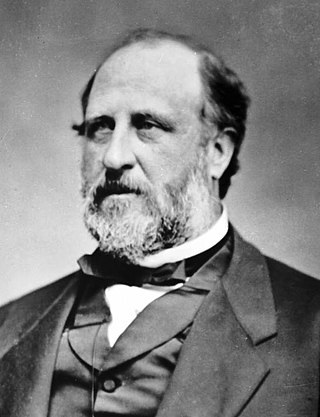
William Magear Tweed, widely known as "Boss" Tweed, was an American politician most notable for being the political boss of Tammany Hall, the Democratic Party's political machine that played a major role in the politics of 19th-century New York City and state.

Cromwell is a town in Middlesex County, Connecticut, United States located in the middle of the state. The town is part of the Lower Connecticut River Valley Planning Region. The population was 14,225 at the 2020 census.
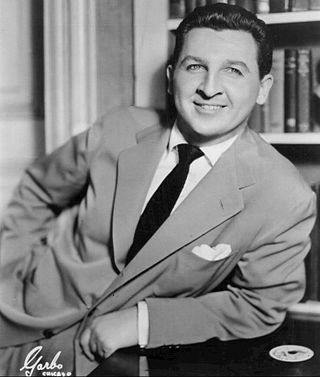
Edward Vincent Bracken was an American actor. Bracken came to Hollywood prominence for his comedic lead performances in the films Hail the Conquering Hero and The Miracle of Morgan's Creek both from 1944, both of which have been preserved by the National Film Registry. During this era, he also had success on Broadway, with performances in plays like Too Many Girls (1940).

A toy or plaything is an object that is used primarily to provide entertainment. Simple examples include toy blocks, board games, and dolls. Toys are often designed for use by children, although many are designed specifically for adults and pets. Toys can provide utilitarian benefits, including physical exercise, cultural awareness, or academic education. Additionally, utilitarian objects, especially those which are no longer needed for their original purpose, can be used as toys. Examples include children building a fort with empty cereal boxes and tissue paper spools, or a toddler playing with a broken TV remote control. The term "toy" can also be used to refer to utilitarian objects purchased for enjoyment rather than need, or for expensive necessities for which a large fraction of the cost represents its ability to provide enjoyment to the owner, such as luxury cars, high-end motorcycles, gaming computers, and flagship smartphones.

Tammany Hall, also known as the Society of St. Tammany, the Sons of St. Tammany, or the Columbian Order, was an American political organization founded in 1786 and incorporated on May 12, 1789, as the Tammany Society. It became the main local political machine of the Democratic Party and played a major role in controlling New York City and New York State politics, and helped immigrants, most notably the Irish, rise in American politics from the 1850s into the 1960s. Tammany usually controlled Democratic nominations and political patronage in Manhattan for over 100 years following the mayoral victory of Fernando Wood in 1854, and used its patronage resources to build a loyal, well-rewarded core of district and precinct leaders; after 1850, the vast majority were Irish Catholics due to mass immigration from Ireland during and after the Irish Famine of the late 1840s.
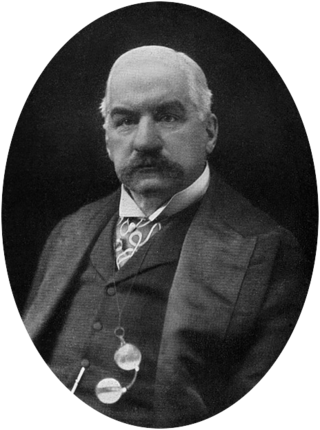
John Pierpont Morgan was an American financier and investment banker who dominated corporate finance on Wall Street throughout the Gilded Age. As the head of the banking firm that ultimately became known as J.P. Morgan and Co., he was the driving force behind the wave of industrial consolidation in the United States spanning the late 19th and early 20th centuries.

Ruth Marianna Handler was an American businesswoman and inventor. She is best known for inventing the Barbie doll in 1959, and being co-founder of toy manufacturer Mattel with her husband Elliot, as well as serving as the company's first president from 1945 to 1975.
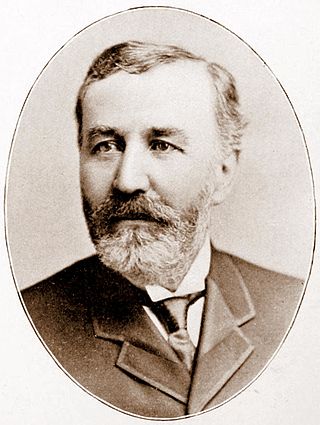
Franklin Edson was an American merchant who served as the 85th Mayor of New York from 1883 to 1884.

Middletown is a city in Middlesex County, Connecticut, United States. Located along the Connecticut River, in the central part of the state, it is 16 miles south of Hartford. Middletown is the largest city in the Lower Connecticut River Valley Planning Region. In 1650, it was incorporated by English settlers as a town under its original Native American name, Mattabeseck, after the local Wangunk village of the same name. They were among many tribes along the Atlantic coast who spoke Algonquian languages. The colonists renamed the settlement in 1653.

Boys & Girls Clubs of America (BGCA) is a national organization of local chapters which provide voluntary after-school programs for young people. The organization, which holds a congressional charter under Title 36 of the United States Code, has its headquarters in Atlanta, with regional offices in Chicago, Dallas, Atlanta, New York City and Los Angeles. BGCA is tax-exempt and partially funded by the federal government.

The A. C. Gilbert Company was an American toy company, once one of the largest in the world. Gilbert originated the Erector Set, which is a construction toy similar to Meccano in the rest of the world, and made chemistry sets, microscope kits, and a line of inexpensive reflector telescopes. In 1938, Gilbert purchased the American Flyer, a manufacturer of toy trains. The Gilbert Company struggled after the death of its founder in 1961 and went out of business in 1967. Its trademarks and toy lines were sold to other companies.
The Ives Manufacturing Company, an American toy manufacturer from 1868 to 1932, was the largest manufacturer of toy trains in the United States from 1910 until 1924, when Lionel Corporation overtook it in sales.

Abram Stevens Hewitt was an American politician, educator, ironmaking industrialist, and lawyer who was mayor of New York City for two years from 1887 to 1888. He also twice served as a U.S. Congressman from New York's 10th and chaired the Democratic National Committee from 1876 to 1877.

During the years of 1898–1945, New York City consolidated. New York City became the capital of national communications, trade, and finance, and of popular culture and high culture. More than one-fourth of the 300 largest corporations in 1920 were headquartered there.

William Lafayette Strong was the 90th Mayor of New York City from 1895 to 1897. He was the last mayor of New York City before the consolidation of the City of Greater New York on January 1, 1898.
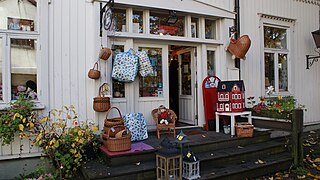
A toy store or toy shop is a type of retail business specializing in selling toys.

Edward Cooper was the 83rd Mayor of New York City from 1879 to 1880 and the second president of the Cooper Union. He was the only surviving son of industrialist Peter Cooper.

Edward Townsend "Ned" Stotesbury was a prominent investment banker, a partner in Philadelphia's Drexel & Co. and its New York affiliate J. P. Morgan & Co. for over fifty-five years. He was involved in the financing of many railroads. Stotesbury, West Virginia, a coal mining town in Raleigh County, is named for him, as well as his equestrian estate, the Stotesbury Club House. Several of the palatial estates he built with his second wife have been demolished in the years since his death.
Toy advertising is the promotion of toys through a variety of media. Advertising campaigns for toys have been criticized for trading on children's naivete and for turning children into premature consumers. Advertising to children is usually regulated to ensure that it meets defined standards of honesty and decency. These rules vary from country to country, with some going as far as banning all advertisements that are directed at children.

Emily Pierson was an American suffragist and physician. Early in her career, Pierson worked as a teacher, and then later, as an organizer for the Connecticut Woman Suffrage Association (CWSA). After women earned the right to vote, she went back to school to become a physician in her hometown of Cromwell, Connecticut. During much of her life, she was interested in socialism, studying and observing in both Russia and China.



















